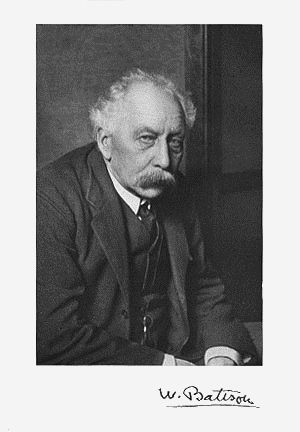Preface
Problems In Genetics (1913)
Kontext: Few who are familiar with the facts that genetic research has revealed are now inclined to speculate as to the manner by which the process [species come into existence] has been accomplished. Our knowledge of the nature and properties of living things is far too meagre to justify any such attempts. Suggestions of course can be made: though, however, these ideas may have a stimulating value in the lecture room, they look weak and thin when set out in print.
William Bateson: Zitate auf Englisch
“Memory is a mystery as deep as any that even psychology can propound.”
Quelle: Problems In Genetics (1913), p. 191
Kontext: Memory is a mystery as deep as any that even psychology can propound. [Natural] Philosophers might perhaps encourage themselves to attack the problem of the nature of memory by reflecting that after all the process may in some of its aspects be comparable with that of inheritance, but the student of genetics, as long as he can keep in close touch with a profitable basis of material fact, will scarcely be tempted to look for inspiration in psychical analogies.
Quelle: Mendel's Principles of Heredity (1913), Chapter XV, p. 289.
Kontext: The concept of evolution as proceeding through the gradual transformation of masses of individuals by the accumulation of impalpable changes is one that the study of genetics shows immediately to be false. Once for all, that burden so gratuitously undertaken in ignorance of generic physiology by the evolutionists of the last century may be cast into oblivion. For the facts of heredity and variation unite to prove that genetic variation is a phenomenon of individuals.
Quelle: Mendel's Principles of Heredity (1913), p. 3
Introductory Chapter, p. 2
Mendel's Principles of Heredity (1913)
Quelle: Problems In Genetics (1913), p. 15
Quelle: Problems In Genetics (1913), p. 12.
Quelle: Problems In Genetics (1913), p. 190
Preface
Problems In Genetics (1913)
Australian Meeting of the British Association. Inaugural Address. August 20th, 1914.
Introductory Chapter, p. 3
Mendel's Principles of Heredity (1913)
Quelle: Mendel's Principles of Heredity (1913), Chapter XV, p. 289.
Quelle: Mendel's Principles of Heredity (1913), Chapter XV, p. 289.
Quelle: Problems In Genetics (1913), p. 10
William Bateson, Mendel's Principles of Heredity (1909), Cambridge University Press, p. 5
Here Bateson alludes to the now-discredit ideas of blending inheritance and pangenesis
Mendel's Principles of Heredity (1913)
Australian Meeting of the British Association. Inaugural Address. August 20th, 1914.
